News



Seminar on “Strategic Stability and China's Strategic Choices” successfully held
On the afternoon of May 25, 2022, a seminar on “Strategic Stability and China's Strategic Choices” was successfully held via Zoom jointly by the School of Political Science & International Relations (SPSIR) / the Institute for China & World Studies of Tongji University, the School of Politics and International Relations of Central China Normal University, and the School of Political Science and Public Administration of Wuhan University. Prof. Men Honghua from Tongji University, Prof. Hu Zongshan from Central China Normal University, and Prof. Ruan Jianping from Wuhan University had in-depth academic discussions and theoretical analysis on the issue of strategic stability. The seminar was moderated by Prof. Zhong Zhenming, Associate Dean of SPSIR. According to incomplete statistics, the seminar was attended by more than 300 students and teachers from 35 universities across China, including Tongji University, Central China Normal University, Wuhan University, Shandong University, Jilin University, Fudan University, University of Chinese Academy of Social Sciences, Beijing Foreign Studies University, and China Foreign Affairs University.
Prof. Men Honghua, Dean of SPSIR and a distinguished professor of the Changjiang Scholars Program of the Ministry of Education, elaborated systematically on the topic of "Strategic Stability in International Relations: A Research Agenda" in five parts: "The Connotation of Strategic Stability and its Evolution", "The U.S.-Soviet Strategic Stability and Global Security", "The U.S.-Russian Strategic Stability and European Security", "China-U.S. Strategic Stability and Asia-Pacific Security", and "Trends in Strategic Stability and China's Choices".
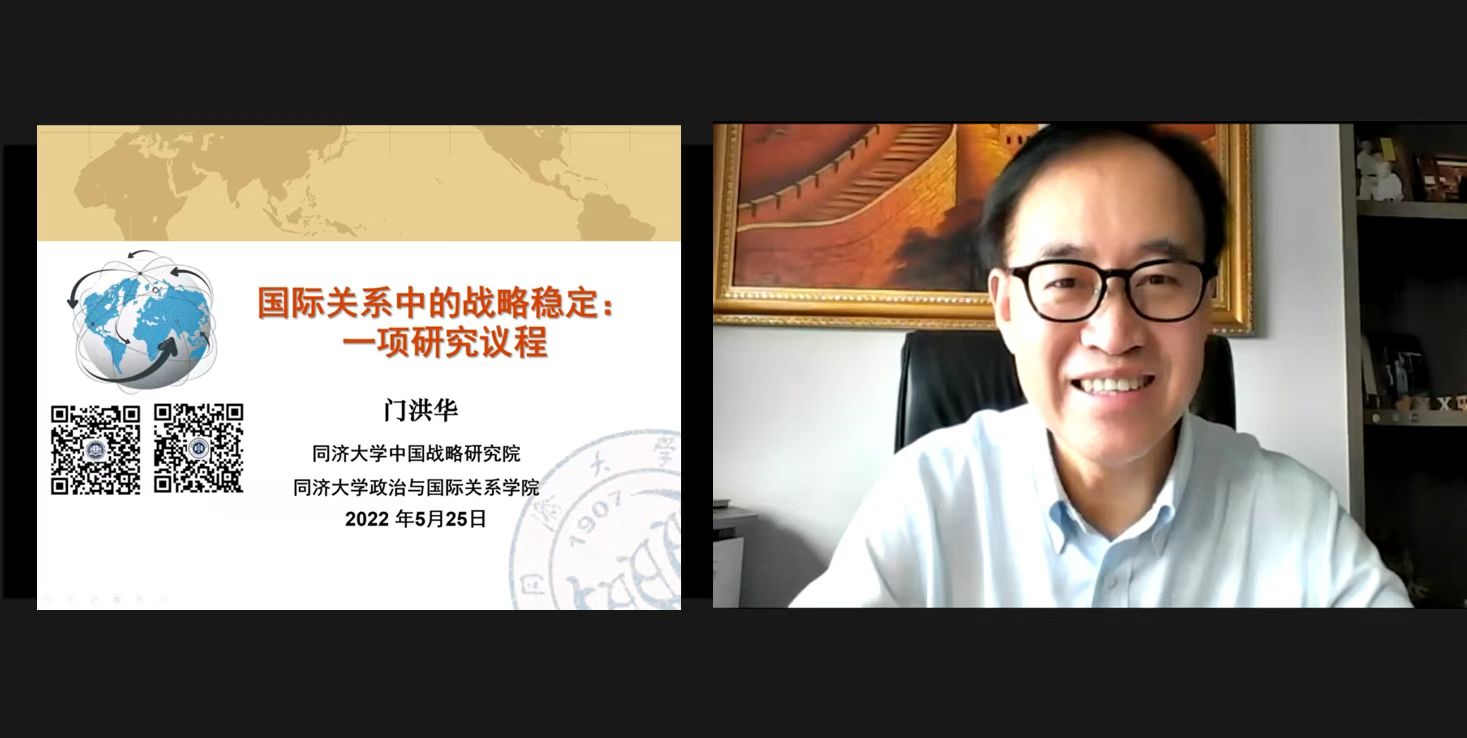
First of all, Prof. Men explored the connotation and extension of strategic stability. By studying the origin and development of the concept of strategic stability and comparing the views of Chinese, American and Russian scholars, he argued that there are two different voices in today’s academic circles: one is to maintain the global predominance of superpowers and the other is to safeguard the universal security. Next, the professor analyzed the formation, development and continuation of the U.S.-Soviet strategic stability during the Cold War. The intense confrontation between the U.S. and the Soviet Union over the missile gap led to negotiations and agreements between the two sides, thus resulting in strategic stability. The U.S.-Soviet strategic stability was based on nuclear parity, with arms control agreements and treaties providing the framework and the nuclear non-proliferation regime acting as a safeguard.
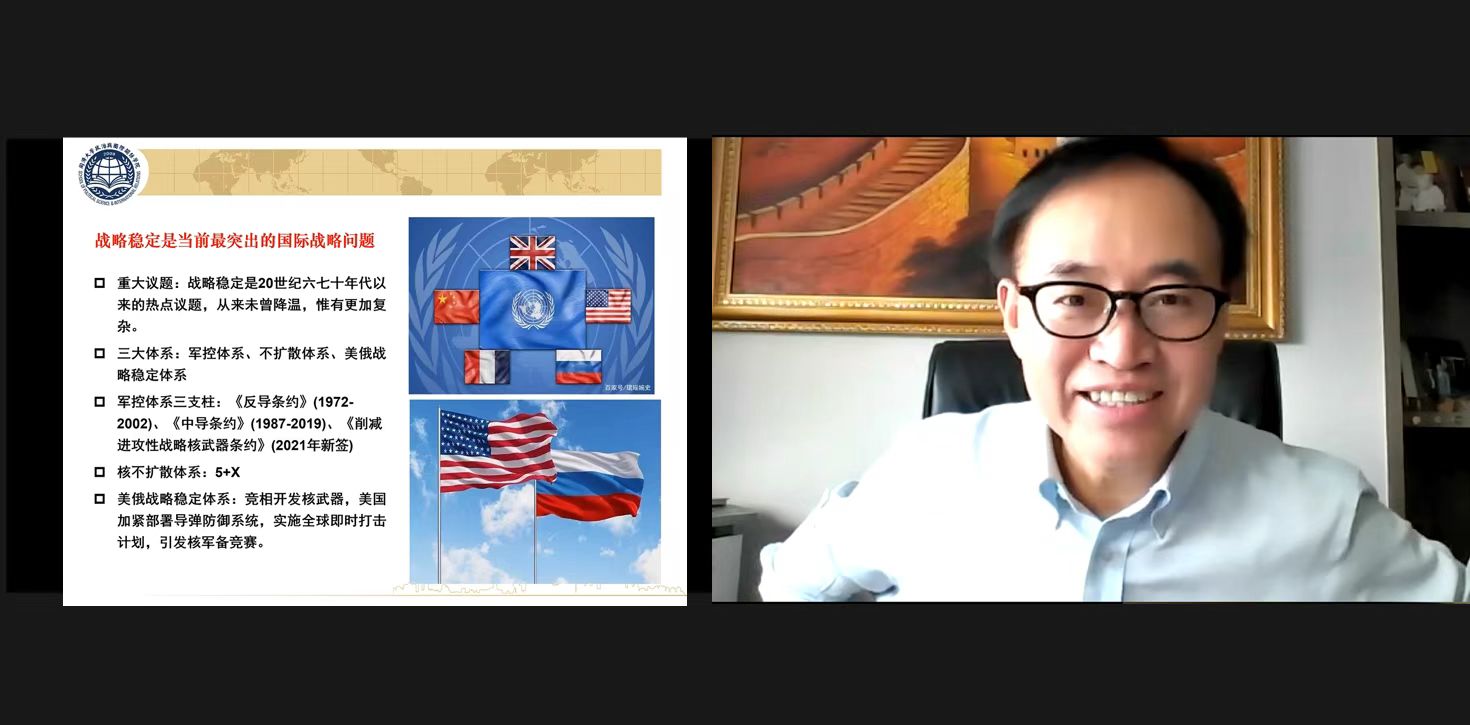
Prof. Men then discussed the U.S.-Russian strategic stability and European security. The evolution of global strategic landscape has been driven by the collapse of the Soviet Union, the end of the Cold War, and the NATO enlargement eastwards, coupled with the impact of technological advances. Through a review of the adjustments in the strategic stability policies of successive U.S. administrations and Russia's response, Prof. Men pointed out that global strategic stability is currently challenged and European security is in a precarious state. In the fourth part, he analyzed the China-U.S. strategic stability and Asia-Pacific security. Strategic stability between the U.S. and China began in the 1980s and made a breakthrough during the Obama administration. However, with the strategic drift of U.S. policy towards China, especially its promotion of strategic competition with China, there have been intense interactions between the two sides in the Asia-Pacific region. In the last part, Prof. Men explored the trends in strategic stability and China's choices. With the deepening of the profound changes unseen in a century and the development of China-U.S. strategic competition, the risk of strategic instability between the two major powers has attracted global attention. In response, the principles of broadening strategic stability, strengthening crisis management, and maintaining asymmetric strategic stability relations should be pursued to promote strategic stability between China and the U.S.
Prof. Hu Zongshan, Dean of the School of Politics and International Relations of Central China Normal University, spoke on the topic of "Imbalance of Power, Strategic Autonomy, and China's New Options for Promoting Strategic Stability" from three aspects, i.e. "The International Pattern and Global Balance of Power", "A New Round of Global Imbalance of Power after the Russia-Ukraine Conflict", and "China's Strategic Autonomy and New Options for Promoting Strategic Stability".
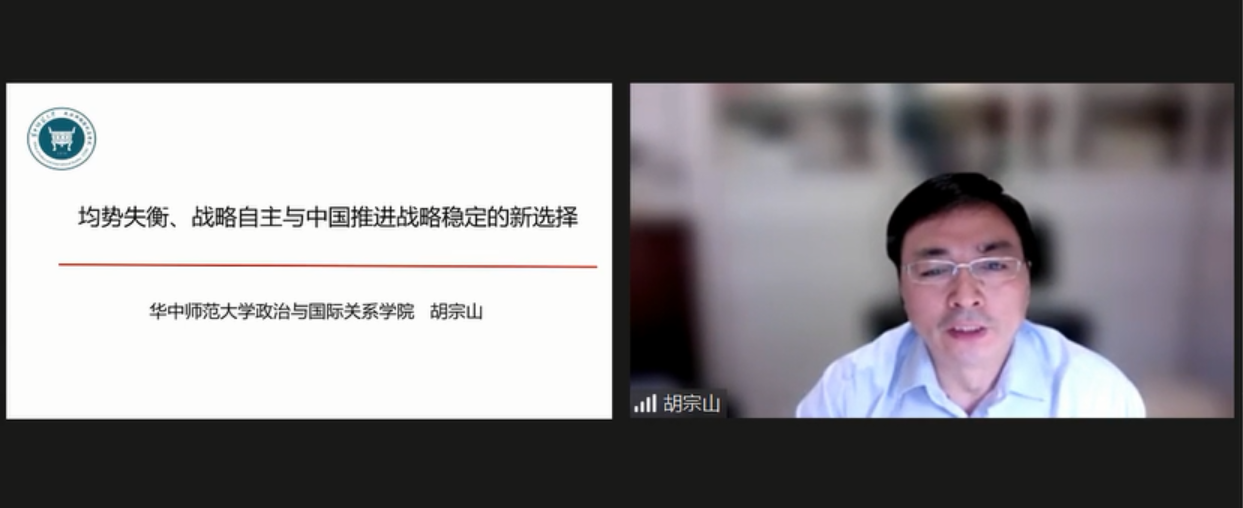
Prof. Hu pointed out that strategic stability is based on the balance of power and that a global imbalance of power will lead to strategic instability. Since the end of the Cold War, the international pattern has evolved from a unipolar-pluralist one to a unipolar-dualistic-multipower one and now to a quasi-bipolar one. After the outbreak of the Russia-Ukraine conflict, the global strategic balance was broken and the formation of a quasi-bipolar pattern is accelerating. Global strategic power has reversed from a state of tendency to balance and improved imbalance to a state of imbalance of power. The fundamental reason is that the U.S has adopted a strategy to strengthen its alliance after the Russia-Ukraine conflict. In Europe, the U.S. has taken advantage of the conflict to kidnap NATO members, with an aim to enhance the unity among NATO and EU members, enlarge NATO's sphere of influence, and strengthen its control over Europe; in East Asia, it has strengthened bilateral alliance with Japan and ROK, and promoted the AUKUS(Australia, the U.K., and the U.S.) trilateral security alliance, the ‘Quad’ (the U.S., India, Japan, and Australia) talks mechanism, and the Five Eyes Alliance to contain China. Prof. Hu stressed that the U.S. is attempting to reverse the development trend of the quasi-bipolar pattern and restore the unipolar pattern by strangling China’s security, stigmatizing its politics, hollowing out its economy, and isolating its diplomacy. In response, China needs to take measures to re-advance the global balance of power and maintain global strategic stability under the premise of strategic autonomy. China's new options for advancing strategic stability are, on the domestic front, to persist in the reform and opening up and promote the “dual circulation” policy that is ready for both emergencies and normal situations at home and abroad to ensure the operation of industrial chain and economic growth; and on the foreign affairs front, to achieve reform and innovation, advance and retreat at the right time, and strategically stay alert. At present, the U.S. is using alliance multilateralism and ally strengthening strategy as means to fully contain and deter China. In this case, China needs to counterbalance the U.S. by adopting a combination of measures to compete with the U.S. and restrict Taiwan, cooperate with Russia and Europe, draw East and Southeast Asia over to its side, and join hands with West Asia, in order to serve China's centenary goals.
On the topic of "Future Trends of the Russia-Ukraine Conflict and Global Strategic Stability", Prof. Ruan Jianping, Associate Dean of the School of Political Science and Public Administration of Wuhan University, illustrated his views in three parts: "Progress of the Russia-Ukraine Conflict", "Impact of the Russia-Ukraine Conflict", and "Scenarios of Global Strategic Stability".
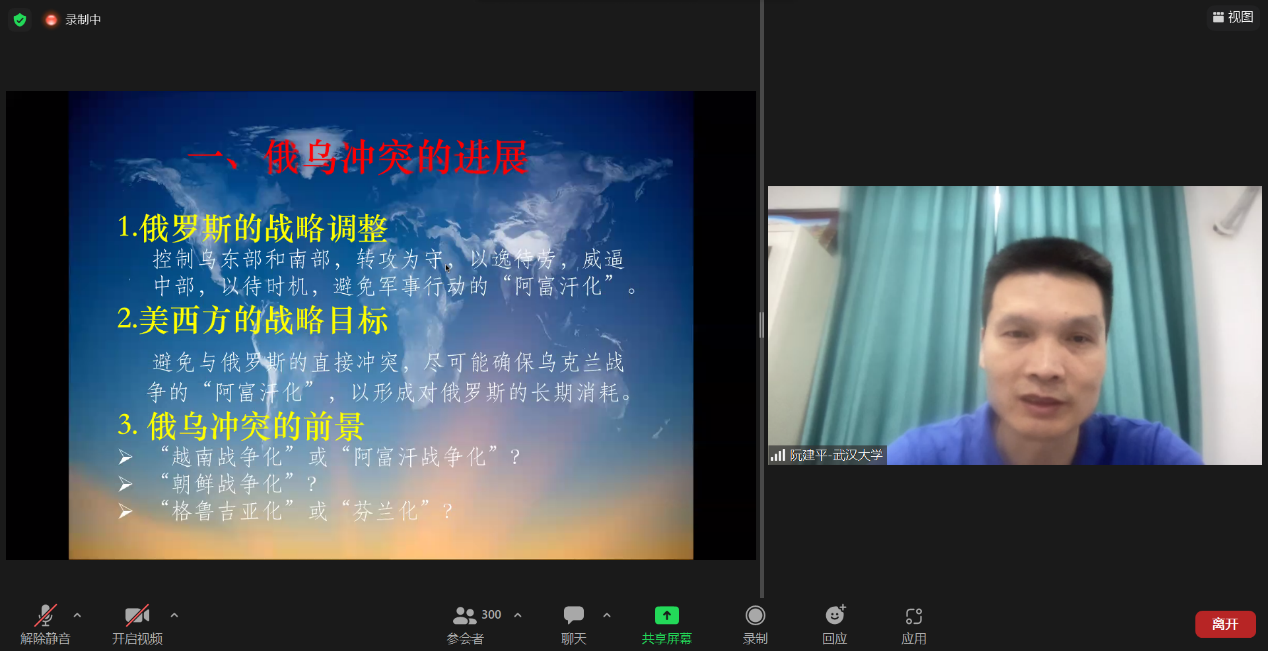
Firstly, Prof. Ruan introduced the progress of the Russia-Ukraine conflict in a chronological manner, together with maps and charts. He pointed out that since the outbreak of the conflict, Russia has adjusted its strategic goal to control eastern and southern Ukraine. Russia has changed from the offensive to the defensive to avoid the "Afghanization" of its military operations. The strategic goal of the U.S. and the West, on the other hand, is to avoid direct conflict with Russia and to ensure, as far as possible, the "Afghanization" of the war in Ukraine in order to create a long-term drain on Russia. The dichotomy between the two goals has led to three different scenarios of the conflict: "Vietnamization", "Koreanization", and "Georgianization". On this basis, the professor gave an in-depth analysis of the implications of the conflict, using detailed data and information. For Russia and Ukraine, the conflict has caused huge human and material losses, and has seriously affected the economic development of both countries. In terms of the global economy, it has undermined global economic recovery and cooperation, and caused price rises and food crises, harming global economic growth. The conflict has also exacerbated global political divisions and confrontations. Particularly, Russia and the U.S. and the West will be locked in a long-term progressive confrontation, Europe's strategic autonomy will be tested as never before, and third-party countries will have to face unprecedented pressure to "take sides". And it will pose serious challenges to China's diplomacy, including public opinion attacks, non-regional sanctions, and strategic deterrence. Finally, Prof. Ruan discussed the prospects for global strategic stability. Based on the interpretation of China's foreign policy stance, he believed that all China needs to do is to maintain its own strategic stability and focus on domestic construction; to keep communication, strengthen risk management, and prevent the crisis from getting out of control; and to build consensus, expand the forces of peace, and counter division and confrontation.
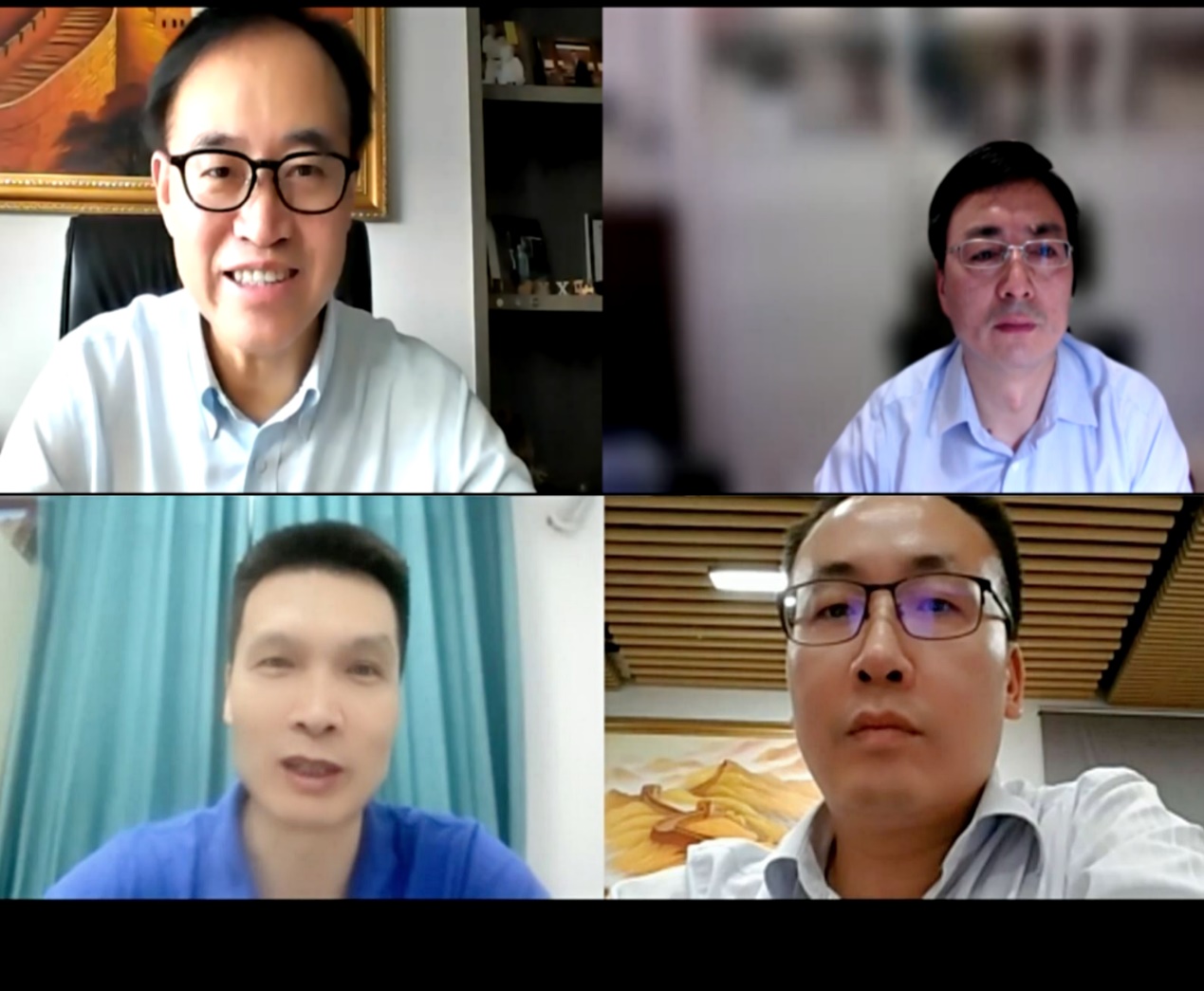
In the interactive session, the three professors had academic exchanges of both theoretical and practical significance with the participants, and gave thought-provoking answers to questions on China's choices to maintain strategic stability, technological competition and global strategic stability, China-U.S. strategic competition and neighboring diplomacy, and China's response to sanctions from the U.S. and Europe, etc. The lecture came to a successful conclusion after three hours of exciting presentations and Q&As.